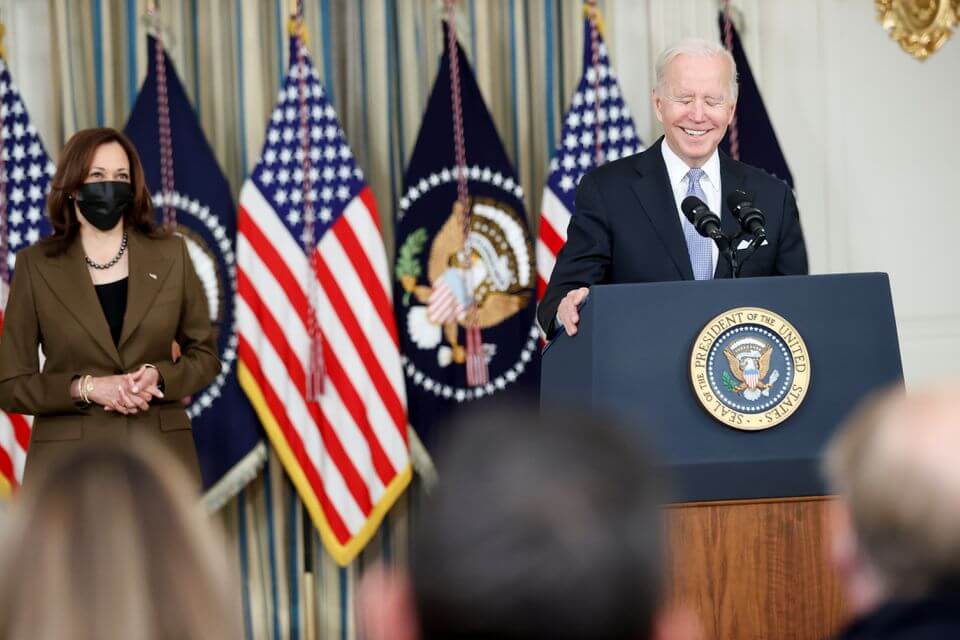On Friday, the United States (US) House of Representatives approved the $1.2 trillion Bipartisan Infrastructure Deal (Infrastructure Investment and Jobs Act) that aims to rejuvenate roads, bridges, pipes, ports, public transport, and internet connection while also incorporating measures to tackle the climate crisis. It was passed with 228 votes in favour and 206 against.
In a statement soon after the deal achieved Congressional passage, US President Joe Biden described it as “a once-in-generation bipartisan infrastructure bill that will create millions of jobs, turn the climate crisis into an opportunity, and put us on a path to win the economic competition.”
Regarding doubts over economic spending of such high magnitude, Biden said, “This bill is also fiscally responsible, fully paid for, and doesn’t raise the deficit.” It does so by taxing the wealthiest Americans and biggest corporations.
The Bipartisan Infrastructure Deal, which was approved by the Senate in August, comprises an investment of $110 billion towards repairing America’s roads and bridges that have been in place since the inception of the interstate highway system in the 50s. Furthermore, it provides $89.9 billion in guaranteed funding to improve public transit infrastructure over the next five years. The deal also includes a separate $66 billion provision for passenger rail networks.
In addition, the legislation addresses the ongoing supply chain crisis by investing “$17 billion in port infrastructure and waterways and $25 billion in airports to address repair and maintenance backlogs, reduce congestion and emissions near ports and airports, and drive electrification and other low-carbon technologies.”
The climate crisis has been a key aspect of Biden’s domestic and foreign plan, and this deal undertakes several initiatives to address that. To this end, it includes a $65 billion investment in clean energy transmission and grid. It also aims to build a network of Electric Vehicle (EV) chargers through an investment of $7.5 billion. Additionally, the deal provides $50 billion towards protecting existing and future infrastructure against the impacts of climate change, cyber-attacks, and extreme weather events.
In an interview with CBS News, Cedric Richmond, a senior adviser to President Biden, said he was “very confident” the bill, which now requires presidential assent, would get going by spring.
Hailing the development, US Secretary of the Treasury Janet Yellen said, “This bill will grow our economy and make it more resilient and sustainable in the process.”
The United Steelworkers Union also endorsed the passing of the bill and tweeted: “The House has passed the #InfrastructureBill, which would provide roughly $1 trillion for upgrading the nation’s critical infrastructure. This is a big freakin’ deal for us because Steelworkers supply America in so many ways.”
However, former President Donald Trump was not pleased with the deal and called it a “disgrace” before lawmakers voted on it. After the bill’s passage, Trump said, “All Republicans who voted for Democrat longevity should be ashamed of themselves, in particular Mitch McConnell, for granting a two-month stay which allowed the Democrats time to work things out at our Country’s, and the Republican Party’s, expense!”
Senate Majority leader and senior GOP member Mitch McConnell said that the bill “provides a massive infusion of fresh federal funding into repairing roads, highways, and bridges, and upgrading broadband connections.” The bill passed the Senate with the support of 19 Republicans in August.
Similarly, the bipartisan coalition of Democrats and 13 Republicans in the House of Representatives was crucial in achieving the 228 votes needed for pushing the bill forward. In fact, without Republican support, the bill would have stalled. According to Newsweek, at least one Republican representative voted for the bill due to their opposition against the progressives.
Six Democrats part of the progressive caucus, notably Cori Bush of Missouri, Alexandria Ocasio-Cortez of New York, and Ilhan Omar of Minnesota, who all voted against the deal until there was consensus on the $1.75 trillion Social Spending Package.
Biden’s initial proposal for the infrastructure bill was $2.3 trillion; however, even after it was trimmed down to $1.7 trillion. the bill also failed to gain any Republican support.
The passing of this bipartisan infrastructure bill provides Biden with much-needed momentum, as debate regarding his $1.75 trillion Social Spending Package, the “Build Back Better Framework,” continues. The House will vote on the Package on November 15.
US Congress Approves $1.2tn Infrastructure Deal, Biden’s $1.75tn Social Package Next
The Deal makes historic investments in repairing and building American infrastructure while also making climate commitments.
November 8, 2021

US President Joe Biden (Right) next to Vice President Kamala Harris SOURCE: REUTERS
